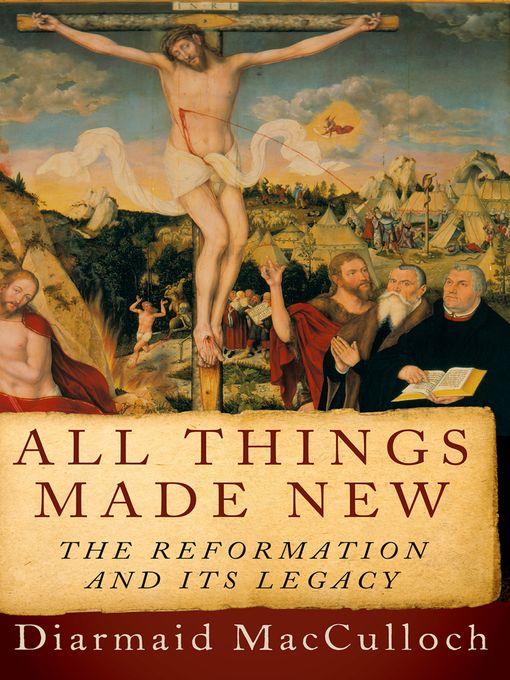
All Things Made New
The Reformation and Its Legacy
- اطلاعات
- نقد و بررسی
- دیدگاه کاربران
نقد و بررسی

October 1, 2016
Church history in general and the English Reformation in particular are no strangers to MacCulloch (church history, Oxford Univ.; Thomas Cranmer). Here the author presents an anthology of previously published essays, articles, and book reviews from the past 25 years. This disparate collection still manages to be remarkably coherent as a whole. There is a general flow in the articles, from the background of the Reformation to the Reformed (as opposed to Lutheran) churches to a focus on the English Reformation and its transformation into the Anglican Communion. Throughout, MacCulloch is at pains to drive home a few themes. He argues that the religious affections and theological convictions of the players had at least as much to do with outcomes of the Reformation as with social or political pressures. Another theme is that those outcomes were not nearly as inevitable as we wish to think. MacCulloch finishes with a brief summary of what animates Anglican Christianity and its peculiar dynamic that insists on carrying its tradition forward. VERDICT This excellent expose of the English Reformation sheds light on how the period forged the practices of Western Christianity, both Protestant and Roman Catholic.--JW
Copyright 2016 Library Journal, LLC Used with permission.

July 11, 2016
MacCulloch (Christianity: The First Three Thousand Years) has written an intriguing set of essays focused primarily on the English Reformation. In the first part, he places the larger European Reformation within the context of an almost unprecedented situation: the long unity of a huge portion of a faith under one banner. But rather than understanding Roman Catholicism as the one true church, he sees it as a product of Platonist innovation or reformation, locating those churches theologically closest to Christ in remnants in Ethiopia and India. MacCulloch then moves to the English Reformation and Henry VIII, whose theological fuzziness introduced a lack of theological clarity into Anglicanism that is perhaps the denomination’s greatest strength. MacCulloch leans into straight history in this section, and some of his best chapters beyond the opening overview essays explore Ann Boleyn, queens Mary and Elizabeth, and Cranmer and the Book of Common Prayer. MacCulloch goes on to discuss the legacy of the English Reformation. The book offers fascinating tidbits about theology and church history in a format well suited to those who enjoy browsing a volume and tasting what they will.

June 15, 2016
Authoritative essays on the Protestant Reformation.A recently knighted academic and acclaimed author, MacCulloch (History of the Church/Oxford Univ.; Silence: A Christian History, 2013, etc.) presents a variety of pieces on the main currents of the Reformation, published previously in scholarly and literary British journals. Grouped into three areas--Reformation elements traversing Europe, those affecting England, and those considered from a modern point of view--the essays take on large themes such as the Council of Trent, the Tudors, and the making of the King James Bible. The author frequently plunges into academic minutiae that are endlessly fascinating but will sail over the heads of nonscholars--e.g., his examination of angels and the Virgin Mary. Delighted that the subject is gaining new interest by academic researchers, MacCulloch ably conveys a sense of the ideological excitement of the era, when the majority of Western Europeans were jolted by the challenges of Martin Luther in terms of how people had considered death, salvation, and the afterlife and were "convinced that they had been cheated." The author underscores how cracking the Catholic Church took an enormous force and thus required an equally forceful counterrevolution to meet it. In his essay on John Calvin, MacCulloch shows how he expertly distilled Catholic doctrine rather than consider himself a Protestant; as such, he could be called the fifth Latin doctor of the Church (after Ambrose, Jerome, Augustine, and Gregory). The author's treatment of the Tudors is masterly, from the reign of Henry VIII, when new rebellious religious identities were emerging and Thomas Cranmer presided over the creation of the first Book of Common Prayer (1549), to Queen Elizabeth I's delight in the church music of William Byrd and the synthesis of Anglicanism from low and high church elements. Experts and lay readers alike can pick and choose elements from MacCulloch's vast store of knowledge.
COPYRIGHT(2016) Kirkus Reviews, ALL RIGHTS RESERVED.




دیدگاه کاربران